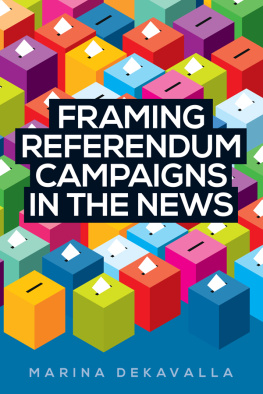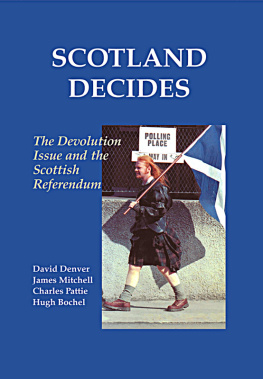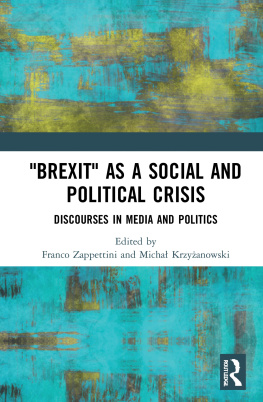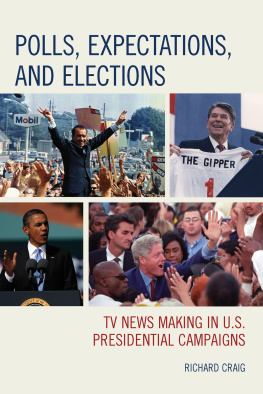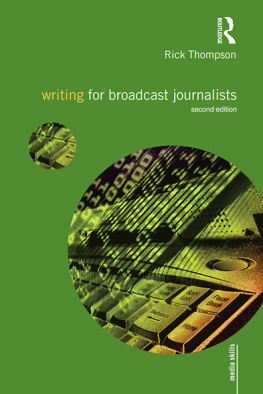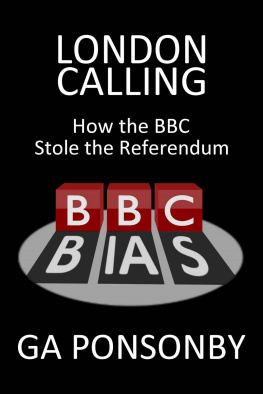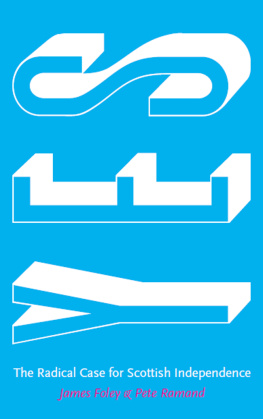Framing referendum campaigns in the news
Framing referendum campaigns in the news
MARINA DEKAVALLA
Manchester University Press
Copyright Marina Dekavalla 2018
The right of Marina Dekavalla to be identified as the author of this work has been asserted by her in accordance with the Copyright, Designs and Patents Act 1988.
Published by Manchester University Press
Altrincham Street, Manchester M1 7JA
www.manchesteruniversitypress.co.uk
British Library Cataloguing-in-Publication Data
A catalogue record for this book is available from the British Library
ISBN 978 1 5261 1989 6 hardback
First published 2018
The publisher has no responsibility for the persistence or accuracy of URLs for any external or third-party internet websites referred to in this book, and does not guarantee that any content on such websites is, or will remain, accurate or appropriate.
Typeset by Out of House Publishing
Contents
I am grateful to the Economic and Social Research Council, which funded the research for this book through the Future Research Leaders scheme (grant number ES/L010062/1). Without their support this work would not have been possible.
I am also grateful to Professor Matthew Hibberd, for all his support during the project. I would also like to thank Professor Neil Blain for his very insightful feedback on early drafts of the manuscript for this book.
Many thanks also to Professor Claes de Vreese and his colleagues at the Amsterdam School of Communication Research, University of Amsterdam; Dr Enric Castell, Dr Marta Montagut and their colleagues at Rovira i Virgili University, Tarragona; and Professor Michele Sorice and his colleagues at Luiss University, Rome, who gave me the opportunity to present early findings of this research during my visits to their institutions in 2015. Also many thanks to the anonymous reviewers of both the proposal for this book and the related journal articles that resulted from the same research.
I would like to thank all my interviewees from BBC Scotland and STV, the broadcasting regulator, the political communicators from both sides of the Scottish referendum debate, and the civil society representatives who kindly took the time to meet me and answer my questions. The 2014 Scottish referendum was a sensitive subject and I am truly grateful that so many key participants in the debate agreed to speak with me so shortly after the event, in early 2015. Many thanks also to those who were not interviewed themselves but helped me reach some of these interviewees, as well as the very patient administrators at BBC Scotland and STV who helped me arrange the interviews around everyones very busy schedules. I would also like to thank BBC Scotland for providing me with copies of earlier campaign coverage in 2013, outside what I had in my own archive, which allowed me to draw comparisons with the analysis of the end of the campaign.
On a personal level, I would like to thank my mother, my partner and my friends for all their love, patience and support. They have made this book possible with their continuous encouragement.
Some of the findings and analysis reported in this book were previously published in different form in the following two journals. appeared in the same form as in this book in article (a):
(a) Dekavalla, M. Issue and game frames in the news: Frame building factors in television coverage of the 2014 Scottish independence referendum. Journalism, published online ahead of print, pp. 120. Copyright 2016 by the Author.
Creative Commons CC-BY: This article is distributed under the terms of the Creative Commons Attribution 3.0 License (https://creativecommons.org/licenses/by/3.0/) which permits reproduction and distribution of the work without further permission provided the original work and license are attributed.
(b) Dekavalla, M. Framing referendum campaigns: The 2014 Scottish independence referendum in the press. Media, Culture and Society, 38(6): 793810. Copyright 2016 by the Author. Reprinted by permission of SAGE Publications, Ltd.
Referendums are an increasingly used form of direct democracy internationally, even though within individual states they tend to be rare, one-off occasions. In just the last two years prior to the time of writing, referendums were organised to decide whether the UK would remain or leave the European Union (2016), the legalisation of same-sex marriage in Ireland (2015), the financing of political parties, the interpretation of taxation law and the structure of election constituencies in Poland (2015), lowering the age of voting and allowing foreign nationals to vote in Luxemburg (2015), accepting EU austerity proposals in Greece (2015), oil and natural gas drilling in Italy (2016), ratifying the peace agreement for the termination of the conflict between the government and the guerrilla military movement in Colombia (2016), and the UkraineEuropean Union Association agreement in the Netherlands (2016), to name but a few of the diverse issues put to the public vote.
In many of these cases, referendum issues were too highly contested for political elites to legislate and consulting the electorate directly was seen as enabling a more straightforward resolution. The outcomes of most of these referendums have had important implications in their respective countries. For instance, the UKs 2016 EU referendum, instigated the most radical change in the countrys relationship with the rest of Europe since the 1970s. Colombias 2016 referendum, on the other hand, could have concluded a fifty-year long conflict, had the proposals not been rejected.
For these reasons referendums matter. It is particularly important to analyse the communication processes that frame referendums in the public domain, and more specifically in the mass media, which in modern democracies are the key platforms of political deliberation and opinion formation. This book analyses mediation practices during a recent referendum as an example, to help us understand the broader process by which the mass media define or frame what a contested political event is about.
This book aims to explain the media framing process in referendum campaigns as a distinctive category of political event. It looks at how the way journalists perform their daily work may impact on the way they construct political issues for their audiences. To address this aim, the book Introduces an original frame-building analytical model (in explores how this model may help us interpret political mediation in referendums in Western and/or Northern European contexts. The model thus makes a contribution to wider debates around the coverage of referendum campaigns in the media.
Much of what the book discusses is not unique to referendums but applies to the mediation of politics more broadly and of election campaigns more specifically. Throughout the book the discussion draws from and contributes to these larger academic debates. However, for reasons that will be explained later in this chapter, referendums deserve separate attention as they are a special kind of event, one of the few instances of direct participatory politics in todays mass representative democracies. They are thus outside the regular experience of most citizens and for this reason how the media explain what they are about becomes even more significant.
The question at the heart of the concept of framing is what is at stake, or what is going on here? Framing was introduced into social sciences from psychology, where it originally referred to individual frames, namely how we define an issue, situation or event in our minds by focusing on some of its aspects over others and using them as cues to understand what is happening. To use one of Goffmans (, but its core essence as an organising principle that helps interpret events remains.

